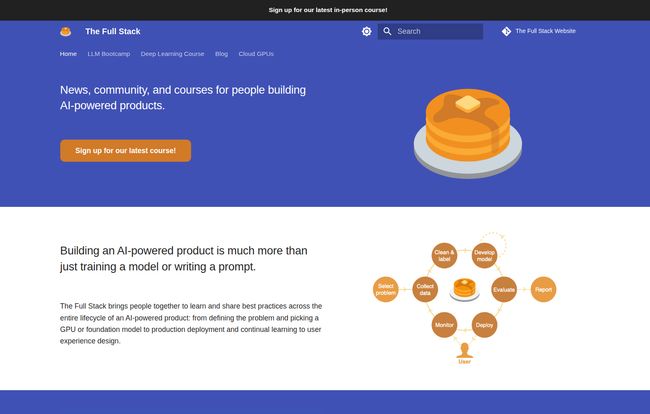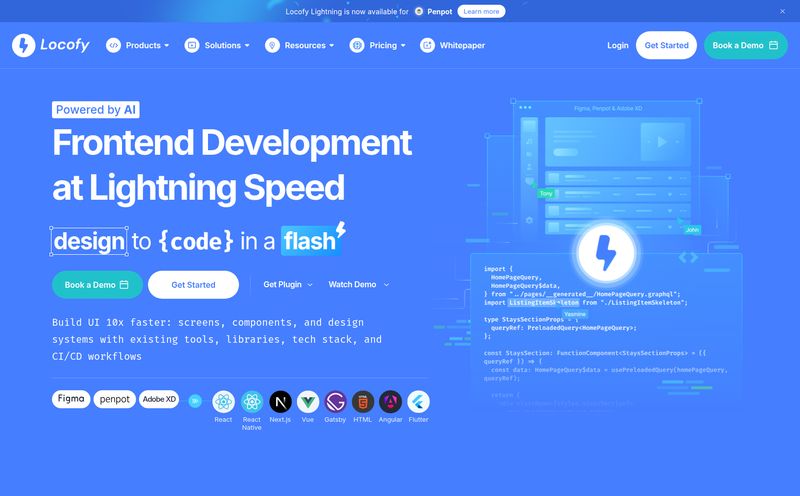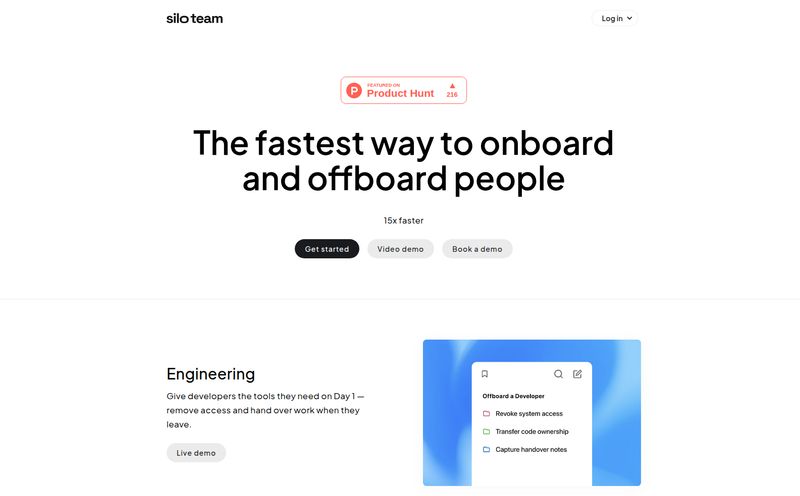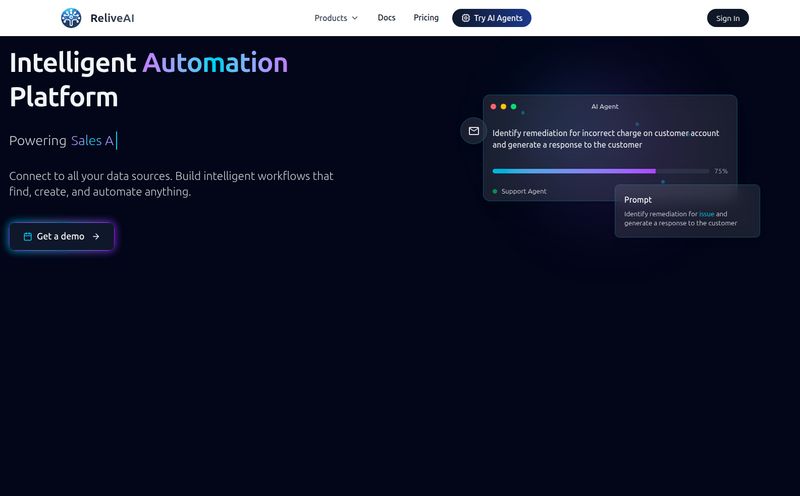The AI space right now feels a bit like the Wild West. Everyone and their dog is a self-proclaimed “prompt engineer,” and the internet is flooded with tutorials on how to build a ChatGPT wrapper in 10 minutes. It's all very exciting, but I've been in the SEO and tech game long enough to know that the shiny new toy is never the whole story. Building a real, scalable, useful AI product is a whole different beast.
It’s not just about getting a model to spit out a decent response. It's about defining a problem, gathering data, deployment, monitoring, handling user feedback, and the dreaded, often whispered term… LLMops. It's a ton of work. So when I stumbled upon a platform called The Full Stack, with its cute pancake logo, I was intrigued. Their whole pitch isn't just about the fluffy pancake on top; it's about the entire, well, stack. But is it just clever marketing, or are they actually serving up something substantial? I had to find out.
What Exactly is The Full Stack? (Beyond the Pancakes)
So, what sets this platform apart? Simple. It’s their focus on the entire AI product lifecycle. Most courses or bootcamps you'll find online are hyper-focused on one tiny slice of the pie. They'll teach you how to train a model. Or how to write a better prompt. That's great, but it's like learning how to install a high-performance engine without knowing how to build the rest of the car.

Visit The Full Stack
The Full Stack looks at the whole picture, from the initial “hey, I have an idea” phase to the nitty-gritty of keeping the thing alive and learning in production. They literally map it out: from selecting a problem and collecting data to deploying the model, monitoring its performance, and iterating based on user experience. This holistic view is, frankly, a breath of fresh air. It’s the stuff that separates a cool weekend project from a viable business.
For years, we've seen this disconnect between data science teams who build the models and the engineering teams who have to somehow wrangle them into a live environment. This platform seems built to bridge that very gap. And I'm here for it.
The Main Courses on the Menu: A Closer Look
The core of the platform seems to be its educational offerings. They have two main headliners that cater to slightly different needs, but both stick to that practical, product-focused philosophy.
The LLM Bootcamp: Your Crash Course in Modern AI Apps
This is the one that probably catches most people's eye first. The Large Language Models (LLM) Bootcamp is designed to get you up to speed on building applications with giants like GPT-4. But again, it's not just a prompt engineering class. They cover the full spectrum: LLM Foundations, UX for LLMs (which is a fascinating and underdeveloped field!), and the big one, LLMops.
If you've ever tried to deploy an LLM-based feature, you know the pain. It's not a simple API call. You have to worry about latency, managing context windows, versioning prompts, and preventing catastrophic failures. The fact that they dedicate a whole chunk of their bootcamp to the operational side of things tells me they get it. They understand the real-world headaches. This isn't just theory; it’s a practical guide to shipping without pulling your hair out.
The Full Stack Deep Learning Course (FSDL): The Foundational Play
If the LLM Bootcamp is the trendy new dish, the Deep Learning Course (FSDL) is the hearty, traditional meal that gives you all your nutrients. This is for building AI-powered applications from the ground up. And the credibility here is pretty impressive. They've partnered with some heavy hitters—UC Berkeley, University of Washington, and the legendary fast.ai. For anyone in the machine learning world, that fast.ai co-sign is a huge green flag.
This course goes deep into the theory, the math, and the hands-on model training. It’s for the person who doesn’t just want to use the AI, but truly understand it. If you're looking to build a career in this field, this seems like an incredible foundation to build upon. It’s the difference between being a cook and being a chef.
It's Not Just About Courses: The Community and News Angle
Let's be honest, learning in a vacuum sucks. Especially in a field that changes every single week. One of the smartest things The Full Stack includes is a community forum. A place to share best practices, ask dumb questions without feeling judged, and get feedback from people who are in the trenches with you.
I can't tell you how many hours I've wasted trying to solve a niche deployment problem that someone else probably solved a month ago. A dedicated community can be an absolute lifesaver. They also have a news and blog section, which seems geared towards cutting through the noise and giving you the important updates without you having to read ten different newsletters and a hundred posts on X (or Twitter, whatever we're calling it this week).
The Real-World View: Pros and Cons I'm Seeing
No platform is perfect, right? After poking around, here’s my honest take on the good and the could-be-better.
The best thing, by a country mile, is that holistic, end-to-end approach. It's their unique selling proposition, and they deliver on the promise. I also love that they offer both a high-level, practical bootcamp for LLMs and a deep, foundational course. It shows they understand the different needs within the developer community. And having some free materials available is a great way to get a taste before you commit.
On the other hand, they're a bit cagey about the pricing. I couldn't find a straightforward pricing page, which is a bit of a pet peeve of mine. You likely have to sign up for a course or their newsletter to get the details. I also have a feeling that some of the content might have a steep learning curve. An absolute beginner might get thrown by the FSDL course, and the website's search function could definately use some work. It feels a little basic for a platform with so much potentially rich content.
So, How Much Does The Full Stack Cost?
This is the million-dollar question, isn't it? As I mentioned, The Full Stack isn't super transparent about its pricing model on the homepage. There's no clear pricing table or subscription tiers listed. Based on my experience with similar educational platforms, this usually means one of two things:
- Courses are sold individually, with prices varying based on the depth and length of the content.
- They operate on a cohort-based model, where you pay a flat fee to join a specific bootcamp or course that runs for a set period.
While some news and community features are free, you should expect the intensive bootcamps and deep learning courses to be a significant investment. My advice? Sign up for their newsletter or the specific course you're interested in. They'll almost certainly send you the pricing details directly. It's a few extra steps, but probably the only way to get a clear answer.
Who is This Platform Really For?
After digging in, I have a pretty clear picture of the ideal user. The Full Stack isn't for the casual tinkerer who just wants to generate some fun images. It's for the professional. It’s for:
- Software Engineers looking to transition into building and deploying AI features.
- Product Managers who need to understand the full scope of an AI project to lead their teams effectively.
- Startup Founders trying to build a business around an AI-powered idea.
- Data Scientists who want to understand the engineering and operational side of their work.
It’s for anyone who has moved past the “wow, AI is cool” phase and is now in the “okay, how do I make this work in the real world?” phase.
My Final Take on The Full Stack
So, is it all just hype? I don't think so. In a world obsessed with the sizzle, The Full Stack is focused on the steak. Or, to stick with their metaphor, they’re serving a complete, balanced breakfast. The fluffy pancake (the model) is there, but so are the eggs, the bacon, and the coffee (the data, deployment, and operations). It’s a much-needed, mature approach to AI education.
It won't be for everyone, and the lack of clear pricing is a small annoyance, but the philosophy is spot on. As AI becomes less of a novelty and more of a standard component in software, platforms like this that teach the whole messy, complicated, wonderful process are going to be absolutely invaluable.
Frequently Asked Questions
- Is The Full Stack for beginners?
- It depends. A complete beginner to programming might find it challenging. However, a software engineer who is a beginner in AI would find the LLM Bootcamp very accessible. The Deep Learning Course is more advanced and assumes some foundational knowledge.
- Are the courses on The Full Stack free?
- Some resources and materials on the site are free to access. However, the main offerings like the LLM Bootcamp and the Deep Learning Course are paid courses. You'll likely need to sign up to get specific pricing information.
- What is LLMops and why is it important?
- LLMops (Large Language Model Operations) is the practice of managing the end-to-end lifecycle of LLMs in production. It covers deployment, monitoring, versioning, and maintenance. It's critical because getting a model to work on your laptop is easy; making it reliable, fast, and scalable for thousands of users is hard.
- How is The Full Stack different from Coursera or Udemy?
- While platforms like Coursera and Udemy offer a vast range of individual AI courses, The Full Stack is more of a specialized, curated platform. Its main differentiator is the integrated, full-lifecycle approach, combining news, a dedicated community, and highly focused bootcamps designed specifically for building and shipping AI products.
- Do I need to know how to code to use The Full Stack?
- Yes, for the most part. The courses are geared towards people who will be building applications, which requires programming knowledge. Product managers or leaders might benefit from the concepts, but the hands-on portions are for developers.
Reference and Sources
- The Full Stack Official Website
- fast.ai - A Key Partner in the FSDL Course
- UC Berkeley EECS Department
- University of Washington Paul G. Allen School of Computer Science & Engineering



